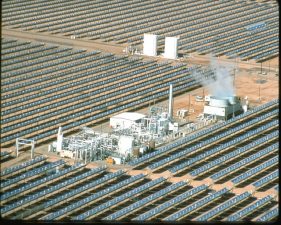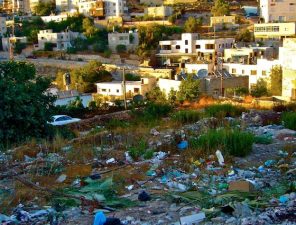 What will Israel do if the Nile Delta becomes submerged from climate change? Brainstorming at the Climate Change Mitigation Policy Workshop today at Ben-Gurion University. (Image courtesy of Ophir Shoham)
What will Israel do if the Nile Delta becomes submerged from climate change? Brainstorming at the Climate Change Mitigation Policy Workshop today at Ben-Gurion University. (Image courtesy of Ophir Shoham)
In his opening remarks at the Climate Change Mitigation Policy Workshop at Ben-Gurion University today, Prof. Alon Tal, one of Israel’s most revered environmentalists, referred to the 20 or so people seated around the conference table as a “dream team” for environmental policy in Israel. Indeed, the workshop featured an all-star lineup of Israeli experts from academia, government, NGOs and the private sector.
The initial reference point for the workshop was the McKinsey report commissioned by the Ministry of Environmental Protection last year, entitled “Greenhouse Gas Abatement Potential in Israel.” Tal said the idea of convening this workshop came to him after realizing that the Israeli environmental community had yet to formulate a concerted response to this report.
The workshop began with presentations from three international experts: Bracken Hendricks, a Senior Fellow at the Center for American Progress in Washington; Dr. Malte Schneider, a Senior Researcher at ETH Zurich; and Joe Kruger, Policy Director at the National Commission on Energy Policy in Washington.
“There’s tremendous opportunity here. Israel could be a leader of global change and serve as a regional hub,” Hendricks asserted, noting that the Middle East and North Africa region is at the center of the climate debate. “Israel is at ground zero: If the Nile Delta is submerged [as a result of climate change], there will be millions of climate refugees.”
Hot showers and cold beers
Hendricks also stressed that climate advocates must make a strong case for the economic benefits of environmental policy: “It’s hard to mobilize people around atmospheric chemistry when people are getting pink slips. What we really care about is hot showers and cold beers.” The US government’s substantial investment in the green economy came as part of the economic recovery package and not as climate change spending, he explained.
Schneider, from ETH Zurich, said he was surprised by the uniqueness of Israel’s situation, including its extensive range of technology for both mitigating and adapting to climate change. He also noted that Israel places special emphasis on energy security and [for now, at least] functions as an “island,” with an isolated grid.
He offered this advice: “Get the first waves of renewables off the ground now,” while continuing to try to figure out the larger picture and formulate long-term policy.
The third international expert, Joe Kruger, noted that Israel’s share of greenhouse gas emissions is negligible on a global scale. Nonetheless, “the world needs Israel to step up and show leadership, to become an innovation center for the world,” he said.
Israel should integrate emissions reduction into its economic development plans, thus serving domestic needs at the same time, Kruger suggested. In particular, he singled out energy efficiency in buildings as an important place to start, and advocated instituting a carbon tax: “Carbon should be considered a cost.”
Calling a spade a spade
Next, it was time for the Israeli experts to present their views. In general, they were less circumspect than the foreign experts in criticizing the McKinsey report. (Dr. Dan Rabinowitz of Tel Aviv University would later explain to the guests that Israelis tend to “call a spade a spade” and that the visitors’ real opinion of the McKinsey report was evident, despite their more polite language: “You also think it sucks!”)
Yosef Abramowitz, president of Arava Power Co., rendered the most scathing indictment of the report, accusing McKinsey of “capitulating to the cynicism of Israeli politics.” Achieving ambitious targets for renewable energy in Israel is “completely doable” he passionately insisted, but complained that Israel’s political leadership has shown “no clarity or courage” in this area.
‘Kick ass’ at the Knesset
On Wednesday, the three foreign visitors will visit the Knesset and meet with the minister of national infrastructure, Uzi Landau. Abramowitz expressed hope that this “nexus of expertise and timing” would wield critical influence with policy makers in Jerusalem.
The cultural anthropologist Rabinowitz offered some advice for the foreign experts: “When you meet with Israeli politicians, remember that they’ll only listen to the first half of the sentence, so save any compliments for last, and first – kick ass.”
Read more about Israel and greenhouse gas emissions:
Are Israeli Emission Controls Hopeless?
Israel Can Do More Than Cleantech to Reduce Regional Carbon Footprint



